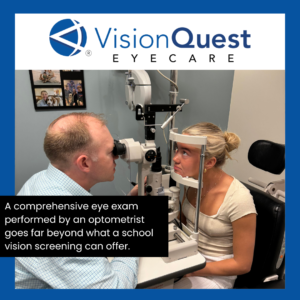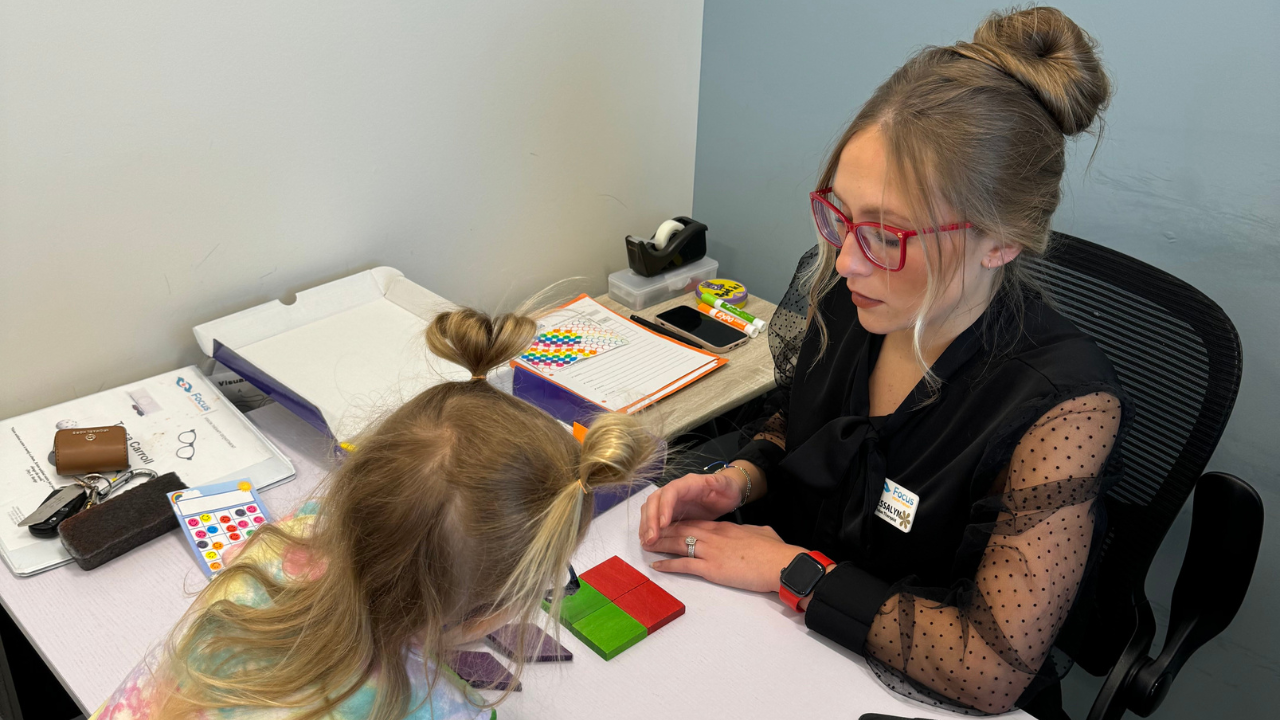Your child’s health and well-being are your top priorities, and their vision is no exception. For many families, the school year often begins with vision screenings conducted by schools or local organizations. While these screenings can help identify some vision problems, they fall short in several critical areas. To ensure your child’s eyes are truly healthy, it’s essential to schedule a comprehensive eye exam with a qualified eye care professional near you.
Here’s why vision screenings at school aren’t enough and why a thorough eye exam is crucial for your child’s overall eye health and development.
What Are Vision Screenings?

Vision screenings are quick assessments that typically measure basic visual acuity. These screenings are often performed by nurses or volunteers in schools to check if a child can see clearly at a distance. In most cases, they use simple tools like the Snellen eye chart (the one with the big “E” at the top) to identify children who may need corrective lenses.
While vision screenings are a great way to catch glaring vision problems, they are not designed to detect more subtle or complex issues. And when it comes to your child’s long-term eye health and visual development, these brief checks are only scratching the surface.
The Limitations of Vision Screenings at School
- Limited Scope
Vision screenings are not the same as comprehensive eye exams. They focus primarily on visual acuity, which measures how well a child can see at a distance. However, clear distance vision doesn’t account for all aspects of healthy eyesight. For example, screenings rarely assess how well the eyes focus, move, or work together — all of which are essential for reading, learning, and everyday tasks. - Missed Vision Conditions
Many eye conditions, such as myopia (nearsightedness), hyperopia (farsightedness), astigmatism, and amblyopia (lazy eye), can go undetected by a basic screening. More concerning are conditions like strabismus (crossed eyes), color blindness, and early signs of eye diseases, which often require a comprehensive exam for accurate diagnosis. - No Assessment of Eye Health
A school screening doesn’t evaluate the overall health of your child’s eyes. Conditions like glaucoma, cataracts, and retinal issues are serious but typically don’t present obvious symptoms in their early stages. Without a comprehensive eye exam, these conditions can remain unnoticed, potentially leading to long-term vision problems. - Inconsistent Testing Procedures
Vision screenings can vary significantly in terms of equipment and testing conditions. In some cases, factors such as poor lighting, distractions, or outdated equipment can influence the results. Additionally, the person conducting the screening may not have the specialized training to recognize more nuanced or complex vision problems.
Why a Comprehensive Eye Exam is Essential
A comprehensive eye exam performed by an optometrist or ophthalmologist goes far beyond what a school vision screening can offer. Here’s what makes it different and why it’s vital for your child’s eye health.
In-Depth Testing
During a comprehensive eye exam at VisionQuest Eyecare, a highly trained eye care professional will conduct a series of tests to evaluate not just visual acuity but also other critical aspects of vision and eye health, including:
- Refraction testing to determine the exact prescription for corrective lenses, if needed.
- Binocular vision assessment to see how well both eyes work together.
- Eye muscle testing to ensure smooth and coordinated eye movements.
- Near vision testing to check for issues that could impact reading and schoolwork.
- Eye health examination using specialized equipment like a slit-lamp to check for diseases or abnormalities in the front and back of the eye, including the retina and optic nerve.
Early Detection of Vision Problems

Unlike a school screening, a comprehensive exam can detect early signs of vision problems that might not yet be affecting your child’s daily life. For instance, myopia control is a growing concern as more children are diagnosed with nearsightedness at a younger age. With specialized treatments like myopia management, we can slow the progression of myopia, helping to protect your child’s long-term vision.
Eye Disease Prevention
A comprehensive eye exam can catch early signs of eye diseases that could affect your child’s vision later in life. Conditions such as diabetic retinopathy, glaucoma, and even age-related macular degeneration often don’t present symptoms until significant damage has been done. Early detection is key to preventing vision loss or more serious complications.
Customized Solutions for Learning-Related Vision Issues
Undiagnosed vision problems can have a significant impact on your child’s learning and academic performance. Conditions such as convergence insufficiency, where the eyes don’t work well together when focusing on close-up tasks, can make reading and studying difficult. At VisionQuest Eyecare, we offer vision therapy programs that can help treat and manage these conditions, improving your child’s learning experience and quality of life.
When Should You Schedule a Comprehensive Eye Exam?
The American Optometric Association (AOA) recommends that children have their first comprehensive eye exam at six months of age, another at age three, and then annually once they begin school. Regular eye exams are crucial, as your child’s vision can change rapidly during their school years.
If your child complains of symptoms such as frequent headaches, eye strain, difficulty reading, or if they seem to be struggling in school without an obvious cause, it’s important to schedule an exam right away. Many times, behavioral or academic issues are tied to uncorrected vision problems that a screening may have missed.
What to Expect During Your Visit to VisionQuest Eyecare
At VisionQuest Eyecare, we are dedicated to providing thorough, compassionate care for your child’s vision. During your child’s comprehensive exam, you can expect:
- A friendly, welcoming environment.
- State-of-the-art diagnostic tools for precise assessments.
- Time with a knowledgeable optometrist who will explain each test and answer any questions you may have.
- A tailored treatment plan based on your child’s unique needs, whether that includes corrective lenses, vision therapy, or management of an eye condition.
Our team at VisionQuest Eyecare has the experience and technology to ensure that your child’s eyes are healthy and developing properly.
Don’t Rely on School Screenings Alone – Schedule a Comprehensive Eye Exam Today!
While school vision screenings are useful for identifying potential issues, they’re not a substitute for a thorough examination by an eye care professional. Ensuring your child receives a comprehensive eye exam is one of the best things you can do to support their vision, learning, and overall health.
At VisionQuest Eyecare, we proudly serve families in Greenwood, Indiana and Fishers, Indiana, offering a range of services including pediatric eye care, myopia control, and vision therapy. Schedule your child’s comprehensive eye exam today by visiting our website or calling our office, and give them the gift of healthy vision for life.

Dr. Chris Browning is a Greenwood native, who has been serving the community through glaucoma care and myopia management. He studied at Indiana University Bloomington and the Indiana University School of Optometry. As he has severe nearsightedness himself, Dr. Browning is passionate about helping others to achieve excellent vision.

